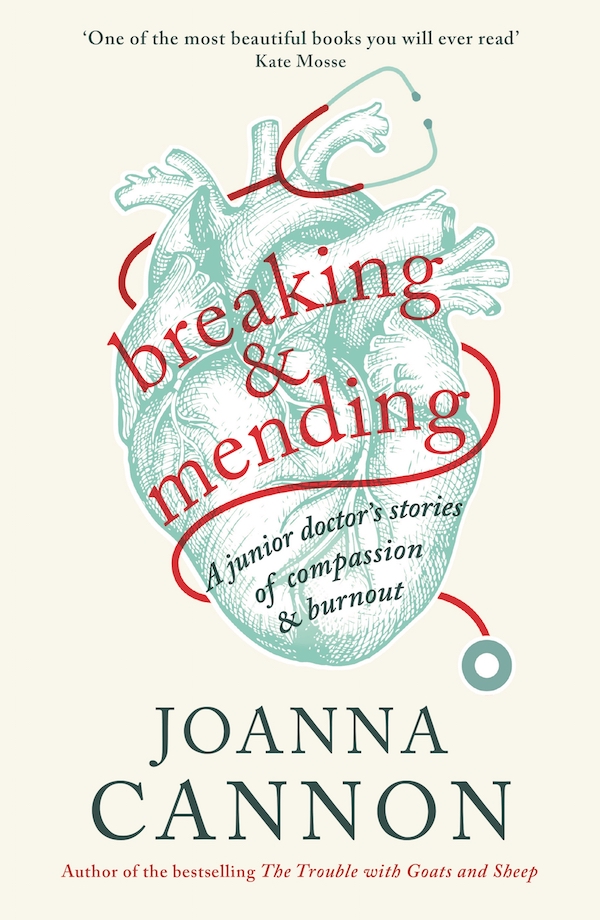Joanna Cannon was a wild card. She left school at 15 with one O-level and after various jobs, including working as a barmaid, she was given a place at medical school. The admissions professor accepted a wild card a year, someone whose path had been unconventional. She trained through her 30s and qualified in her 40s. She subsequently practiced as an NHS psychiatrist — but only for a few years. After her first novel become a best-seller, she left. Her experiences indicate that the emotional toll was too much, but she has now published this series of tightly argued glimpses into her interactions with patients, nurses, doctors, and the actual environments in which she worked. While she is no longer a full-time practicing psychiatrist, like thousands of others, she volunteers in the NHS.
Cannon divides practitioners into two broad categories: white coats who achieve distance and cardigans who become personally involved, perhaps too much so. One of the many reasons Cannon was drawn to psychiatry is that doctors must interact with the patient. She is clear-eyed that conventional kindness may not be the way to go. Her account of non-smoking marathon-running family-man Paul, aged 38 with a wife and two small children and dying of pancreatic cancer, is heart-breaking. She cannot even bear to find out what happens when he is moved from her hospital. Can you feel too much?
Instances of insensitivity and even hostility abound. An A&E consultant looks at her with disgust when she indicates she must eat to avoid collapse. On her first night shift as a fully-trained doctor her registrar hands her his bleeper and slopes off to catch a plane – at 2 am. The madness of NHS bureaucracy and its short-sightedness shows up brutal ways. At least three junior doctors Cannon knew had fatal car crashes driving home after all nighters — presumably falling asleep at the wheel. A heavy toll for those who save others’ lives.
 In lapidary prose she vividly brings to life hospitals’ atmospheres. Surgical wards start early and conduct fast business: we are reminded surgeons belong in operating theatres, where patients can’t talk back. There are endless corridors — a city of streets and shops and wards contained in a single building. Hospitals at night thrum with the white noise of trolley wheels, metal trays, telephones, footsteps and conversations. People – nurses, doctors, porters, cleaners, patients and visitors — are more or less silent.
In lapidary prose she vividly brings to life hospitals’ atmospheres. Surgical wards start early and conduct fast business: we are reminded surgeons belong in operating theatres, where patients can’t talk back. There are endless corridors — a city of streets and shops and wards contained in a single building. Hospitals at night thrum with the white noise of trolley wheels, metal trays, telephones, footsteps and conversations. People – nurses, doctors, porters, cleaners, patients and visitors — are more or less silent.We walk the wards with Cannon but she tells us she could never become the doctor she wanted to be because you would not survive. Survive what, though? The system? The people? Underneath it all is the question: does compassion inevitably lead to burn-out? Cannon seems to think so. If she is right this is a devastating conclusion. But compassion rather than protective indifference may be the saving grace.
Cannon befriends patients. She also berates herself for crossing invisible lines and boundaries. In ‘The Darkest Hour’ she encounters a woman in extreme pain, dying of cancer, who has had all the morphine legally allowed. An appeal to a consultant allows the torment to cease. She befriends Joan, a 79 year-old who is blind, deaf and suffering from many forms of cancer. She quotes pithy exchanges with consultants, nurses and patients. A woman suffering acute mental illness states that she does not want to medicate her voices out of existence, for in her extreme loneliness they are her only friends. Thinking of consultants both kind and bullying, the ward sister opines that everyone has to feel valued.
Underneath it all lies the inescapable truth that doctors and nurses are mere people. They are not superhuman, and if the system does not allow them to take care of themselves as well as others, it is failing – which has consequences for all of us. Cannon’s highly personal book pleads for mutual care and understanding.
- Joanna Cannon, Breaking and Mending: A junior doctor's stories of compassion and burnout is published by Profile Books
- Read more book reviews on theartsdesk















Add comment